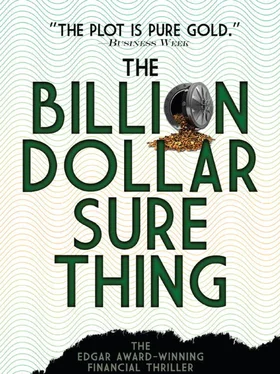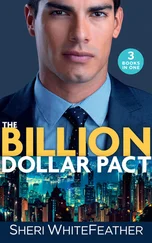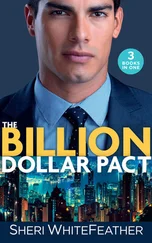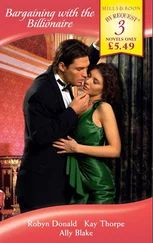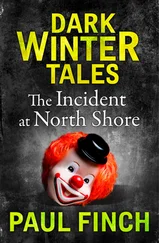“And what about the Americans?”
“I’ll have to deal with them in my own way.”
“This could get pretty bad before the weekend, I imagine.”
“Yes. So if you’ll please excuse me, Herr Bernoulli, I really must get back on the job.”
“Just one more question. Do you really think the Russians would pull such a brazen, naked attempt to disgrace the United States?”
“A few years ago I would have said no. But the young Turks are starting to take over in the Soviet Union. They’re anything but Stalinists. But they are also not of the Khrushchev school. They calculate. They recognize that the best weapon at the disposal of the Soviet Union is not the Red Army of Stalin, or their rockets, but the immense economic potential of their country. And contrary to Western countries, they have absolute central control of their economy. They can direct its energy like a general his army. But the weak point has always been the ruble. Or to put it another way, the dominating role of the dollar. Downgrade the latter, and you automatically upgrade the former in many areas of the world. Destruction of faith in the dollar system cannot help but be a major policy objective of anyone at odds with the United States. De Gaulle recognized all this years ago and took the initiative. He did not succeed. The Russians are in a quite different class, of course.”
“But the risk.”
“What risk? The United States has absolutely no means of retaliation. And on the dollar issue, it also has very few allies. On gold, none. The power of the dollar is a greater source of resentment throughout the Western world than any other element of American foreign policy, even right here in Switzerland.”
Bernoulli rose and shook hands with Bollinger.
But as he was leaving, he got in one parting shot. “To my simple mind, this all seems just a little too pat. In any case, if anything new develops, we’ll probably see each other again.”
As Bernoulli left, Bollinger picked up his phone and called the foreign exchange desk of the bank.
“What’s happening in New York?”
“It’s continuing, sir. The bid price on spot francs has now dropped to just a shade under 3.31 cents. As you know, under the term of the 1973 monetary agreement, the Swiss National Bank must intervene at this level. They will have to start buying dollars. What do you want us to do?”
“Nothing at the moment. But nobody goes home this evening until I say so. We might have to stay on right through Tokyo tonight.”
He hung up and redialed. “Joan, get me the President of the National Bank in Zurich, please. Right away.”
The call was through in less then thirty seconds. “This is Bollinger. How do things look to you?”
“We don’t like it a bit. Where’s all this selling coming from?”
Bollinger thought carefully before he replied. “Seems to have started in Eastern Europe. Then Zurich, Frankfurt, Paris, it would seem.”
“What are you fellows going to do?”
“I’m not sure. Maybe it will start to correct itself in New York.”
The National Bank president did not seem to buy that one.
“I’m not so sure. Funny damned thing. It came out of absolutely nowhere. We’ve more or less got used to these currency speculators crawling out of the woodwork every fall, but normally you can see them coming. This thing has all built up within twenty-four hours.”
“You’ve heard about New York, I suppose. The dollar has dropped below the 3.31 level. Will you start to intervene?”
“We’re having a meeting in about fifteen minutes on that subject. My guess is that we’ll try to hold it here for the rest of the day. A slight turnaround in Europe tomorrow could produce a surge of covering of short positions. Then we would be out of the woods. That’s my thinking at the moment.”
“Thanks. That’s very important for us. We will probably also be in the market in New York within a short time, trying to stop this thing. I’ll keep in touch.”
“What are the people in Washington saying?”
“I don’t know. I expect to hear from them any moment now,” replied Bollinger.
“Right. Thanks for the call.”
Although already five o’clock in Switzerland, it was only eleven in the morning in Washington. The secretary of the treasury was just entering the White House grounds in his limousine. As he stepped out of the car another government vehicle rolled up right behind him. It was the secretary of state. Both cleared the security people together, and were immediately met by one of the president’s assistants who took them directly to the Cabinet room.
The chairman of the Federal Reserve Board was already there. Less than a minute later the president arrived and asked them all to be seated.
He turned first to Secretary of the Treasury Henry Crosby.
“Henry, what’s going on? I got word from the Intelligence people less than an hour ago. They report that massive selling of the dollar has set in in Europe, and that the gold price has gone sky high. What’s more, they claim that the Russians started it all. How is that possible, for God’s sake?”
“I don’t know. I just know that it’s a fact.”
“When did it start exactly?”
“Yesterday. During the afternoon in New York, and then at the tail end of the banking day in San Francisco. Nothing startling, but steady selling was there. Then during the European business day today that’s just ending, it really started to pick up steam. The last hours have seen nothing short of a mass movement out of dollars and into the Swiss franc, the German mark, the guilder—you name it. The speculators seem to have joined in with full force only today.”
“How can you tell?”
“All of a sudden the rates of future dollars began to plummet. And the gold price shot up $4 within one hour. What has everybody worried is that suddenly this has taken on all the characteristics of a highly organized effort.”
“What do you propose to do, Henry?” As so often in the past, it was to Crosby that the president turned for advice when faced with a crisis situation.
“Well, we must be careful not to repeat the mistake the British made in 1967.”
“And that was?”
“The circumstances were very similar to those right now. Somehow the word started getting around on a Tuesday or Wednesday that the pound was going to go on the weekend. By Thursday every last bank clerk in Europe knew about it. Instead of facing the fact that the news had leaked, the Bank of England intervened to protect the pound right down to the wire, not only in the spot market—they also were buying everything that was being offered by speculators in the forward markets as well. They lost £1.5 billion in two days that way, until even they had to give up around noon on Friday.
“The entire exercise had proven futile. Their losses could be peanuts compared to what it could cost us this week should the buildup against the dollar continue. My guess is anything between five and ten billion.”
“What’s the answer?”
“We’ve just two alternatives. Close the banks now, before this develops into total chaos. Or bluff our way through, cost what it may, knowing we may make fools of ourselves in the process.”
The president had listened carefully to every word. Then he turned to the secretary of state.
“Charles, what do you think?”
“First, I disagree with the diagnosis. We are still a long way from what Henry terms total chaos. The rates have barely fallen to levels where government intervention becomes necessary. This has happened before. In fact, since 1971 it must have occurred a dozen times. We bluffed our way through then, and I’m sure we can do it again now. After all, we only have a few more days to go.”
Читать дальше
